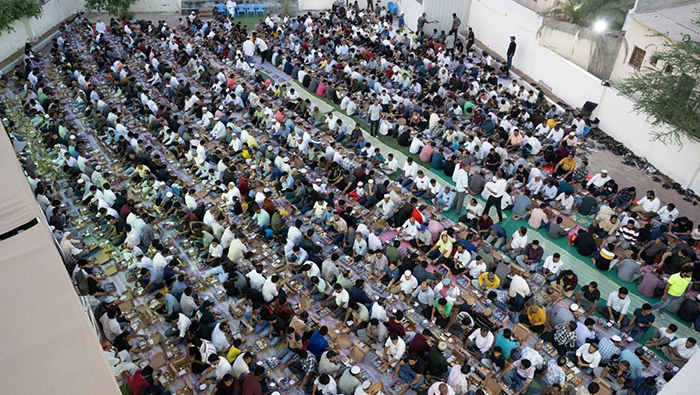
Muscat: For thousands of blue-collar Muslim workers from the Indian subcontinent, community Iftars and mass gatherings at large mosques were a cherished tradition during the holy month of Ramadan, fostering a sense of brotherhood and camaraderie.
However, in recent years since the onset of the COVID-19 pandemic, such gatherings, including those at prominent mosques like the Grand Mosque and the Sultan Qaboos Mosque in Ruwi, have been halted. Understandably, many have expressed disappointment.
Despite the absence of these large-scale Iftar events, smaller mosques continue to provide Iftar meals. Additionally, individuals and organisations have stepped up to distribute Iftar meals this year.
Mohammed Salauddin, a domestic worker from Bangladesh, recalls the community Iftar meals at the Grand Mosque in years past.
“The pandemic halted these gatherings for good reason,” he said. “But now that things are returning to normal, I hoped to see Iftars at bigger mosques resume but they haven’t. They are better organised and provide a sense of blessing as we pray and break the fast together.”
For workers who begin their day early, these Iftar gatherings were not just about the meal but also an opportunity for community bonding.
The absence of public Iftars for the fourth consecutive year has left a void.
“During Ramadan, visiting mosques regularly allows us to connect with different people and form friendships,” said Mohammed Babar, a Pakistani expatriate. “The shared experience of breaking fast together strengthens our sense of community.”
Public Iftar meals are particularly crucial for low-wage expatriates, saving them both money and time.
“After a long day of work, preparing Iftar meals is often too exhausting,” said Salauddin.
However, it’s not just the meal that’s missed; it’s the warmth and camaraderie shared with strangers at the mosque.
Rehman A, an Indian expatriate, lamented the absence of Iftar gatherings at the Sultan Qaboos Mosque in Ruwi, echoing sentiments of lost community growth opportunities.
Despite the suspension of communal Iftars, acts of charity persist. Many individuals and organisations distribute Iftar meals daily, with some anonymous donors even organising food parcels in areas like Ghubra and Ghala industrial Area.
“The sufferings of Palestinian people in Gaza deeply pains us,” said Salim Al Balushi, an Omani donor. “This time, I have decided to direct my major donation towards Gaza. However, I still am ensuring to organise Iftar meals, but for fewer people.”
For many, like Mazin Sharif, a Pakistani worker, the reliance on the generosity of others for Iftar meals contrasts sharply with the ease of community gatherings in the past. “Before, it was easier to visit a large mosque and have an Iftar meal,” Sharif said.
Labourers and workers on Ruwi High Street said the practicality of community Iftars, save them precious time they would otherwise spend cooking after a long day’s work.
“We struggle to earn daily,” Mustafa Mohammed, a Bangladeshi expatriate worker living in Hamriya, said. “If we spend time preparing Iftar meals, then we lose out on work.”
During Ramadan, the spirit of generosity transcends backgrounds and ethnicities, as food and provisions are generously shared with people from all walks of life in and around the cities.